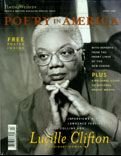On February 13, 2010, American poet Lucille Clifton passed away. This interview with her was published in an April 1999 special issue of Poets & Writers Magazine, on which she graced the cover.

Born in Depew, New York, in 1936 and reared in Buffalo, Lucille Clifton published her first book of verse, Good Times, in 1969. She went on to publish Good News About the Earth (1972), An Ordinary Woman (1974), Generations (1976), Two-Headed Woman (1980), Good Woman: Poems and a Memoir, 1969-1980 (1987), Next (1987), Ten Oxherding Pictures (1989), Quilting: Poems 1987-1990 (1991), The Book of Light (1993), which contains "brothers," a transcendent sequence written from Lucifer's perspective, and The Terrible Stories (1996), which reflects on Clifton's survival of breast cancer. She has also published numerous books for children. Her most popular poems include the gracefully meditative "the thirty eighth year," the amusingly affirmative "homage to my hips," and the scathingly witty "wishes for sons." The special brand of instruction in her magical lyrics depends on keen social awareness and a disciplined intuition-both hers and ours. Her poems about race relations, womanhood, and self-affirmation often seem like parables that only our hearts fully grasp. She has twice been nominated for the Pulitzer Prize and is the recipient of many other honors, including a 1999 Lila Wallace-Reader's Digest Writers' Award. Currently at work on a collection of new and selected poems, she is Distinguished Professor of Humanities at St. Mary's College of Maryland. This spring she has a visiting position at Duke University as the Blackburn Professor of Creative Writing. Her home is in Columbia, Maryland, where this interview took place on a brilliant Saturday afternoon.
Your name, Lucille, and the names of your family members often show up in your poetry as well as in your memoir, Generations. And in the poem, "I am accused of tending to the past," in Quilting, you describe the past as "a monstrous unnamed baby" that the narrator has taken to her breast and named "History" with a capital H. So I was wondering, why are names and the process of naming so important to you?
Well, I was alive during the sixties when African Americans changing their names caued a great stir. And naming is as close as we can outwardly come to identifying ourselves, my menesss. Now, for me, because Lucille means light, I can get a lot of metaphor and baggage and all that sort of thing from that. And so I suppose I think that being able to name is somehow being able to place, to identify.
When did you start working with your own name, Lucille, as a poetic device?
When I understood, when I thought about what it meant.
And when was that?
I was very young. I started writing when I was about ten. [I was] perhaps a little older than that when [my name] began to take on metaphoric meaning for me.
What happened to you at ten that caused you to sit down and start writing?
Well, I loved words always, and my mother used to write poetry, so I saw it as something to do. I think everyone has in his or her self the urge to express, and people do it with what they love, I suppose. Cooks do it with food; there are people who do it with hair, with clothing, fabric. I loved words, always-the sound of words, the feeling of words in my mouth—and so I did it that way.
I was recently approached about writing an entry on you for a reference book on contemporary Southern writers.
Isn't that interesting? I'm in an anthology also of Catholic writers. [Laughter.] I said to the [editor], "But I'm not Catholic." And she said, "Doesn't matter." I don't think of myself as Southern, though people think of my home as Maryland although my home is Buffalo, New York.
That's what I wanted to ask you about. You write about racial identity, gender identity, and family identity, but I'm wondering about geographical identity. How does that fit into who you see yourself as being?
I don't think that I particularly feel a geographical identity. It may well be somewhat related to something I read about Robert Penn Warren sometime back. The article said that when he graduated from college, he bought an old car and he traveled across the country. And he wanted to see the landscape; he wanted to look at this country. And I was understanding then that that's why, maybe, I know something about the people in this country, but I'm not a landscape person. I don't identify that much with landscape.
Why do you think that is?
Because it was not available to me. There's no way a person of my age, who looks like me, could have gotten a car and gone across this country safely. It's not possible. We're talking about the fifties and sixties.
Critics often talk about your affirming spirit and the celebratory qualities in your verse, and I certainly see those, too. But there's also a lot of anger and sorrow and uncertainty in your writing, and it seems like the hopeful essence really has to struggle against those forces.
It does! [Laughter.] That's because I'm human. I'm doing a "new and selected" now, and a couple of friends have seen some of the poems, and they say this is going to be a dark book.
Is it?
Well, I don't think it's dark. I think it's just...you know, I have a poem about dialysis, for instance. I was on dialysis. And it ends...something about "i am alive and furious," and then it ends with a question, "blessed be even this?" [Some critics] would expect of me, "blessed be even this." Well, I'm not sure about that. You know, dialysis is not fun. Kidney failure is not fun.







